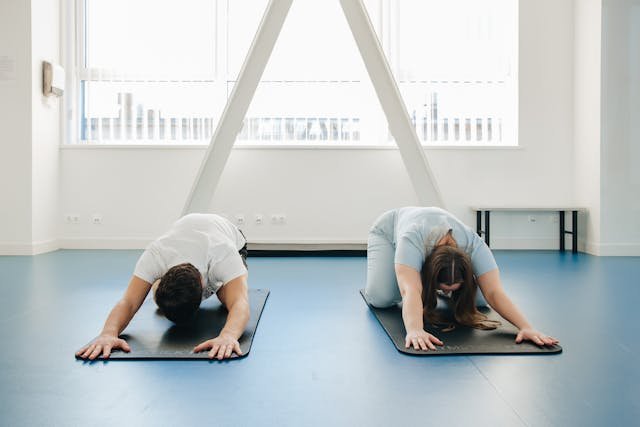Battling fibromyalgia’s persistent pain and fatigue can feel overwhelming, yet new research sheds light on how gentle movement practices can offer significant relief. Let’s examine how Tai Chi and Yoga can play a crucial role in managing fibromyalgia symptoms and improving overall quality of life.
Understanding Fibromyalgia
Fibromyalgia is a complex condition characterized by widespread muscle pain, fatigue, sleep disturbances, and cognitive issues. While traditional treatments often include medications and lifestyle modifications, many patients are turning to complementary approaches to find relief.
The Tai Chi Revolution in Fibromyalgia Care
Tai Chi, an ancient Chinese practice combining slow, fluid movements with deep breathing and mental focus, has gained significant attention in the medical community for its potential benefits in fibromyalgia management.
Research-Backed Benefits of Tai Chi
A groundbreaking 2018 study published in the BMJ compared the effectiveness of Tai Chi to aerobic exercise, a standard recommendation for fibromyalgia patients. The results were eye-opening:
- Superior Symptom Relief: Participants practicing Tai Chi experienced greater improvement in fibromyalgia symptoms compared to those doing aerobic exercise.
- Long-Term Benefits: The positive effects of Tai Chi were sustained even at 52 weeks post-intervention.
- Frequency Matters: Practicing Tai Chi twice weekly for 24 weeks showed the most significant benefits.
- Better Adherence: Participants were more likely to stick with Tai Chi classes compared to aerobic exercise sessions.
How Tai Chi Helps
Tai Chi’s effectiveness in fibromyalgia management can be attributed to several factors:
- Gentle Movement: The slow, controlled movements of Tai Chi provide a low-impact form of exercise that’s accessible to many fibromyalgia patients.
- Mind-Body Connection: The practice encourages a focus on breathing and movement, potentially helping to reduce stress and improve pain perception.
- Balance and Coordination: Regular practice can enhance physical function and reduce the risk of falls, a common concern for fibromyalgia patients.
Yoga: A Flexible Approach to Fibromyalgia Management
Yoga, with its combination of physical postures, breathing techniques, and relaxation, offers another promising avenue for fibromyalgia relief.
The Science Behind Yoga for Fibromyalgia
While research on yoga for fibromyalgia is still evolving, several studies have shown promising results:
- Pain Reduction: A systematic review found that yoga interventions can lead to significant reductions in pain intensity for fibromyalgia patients.
- Improved Functionality: Regular yoga practice has been associated with enhanced physical function and reduced disability in individuals with fibromyalgia.
- Mental Health Benefits: Yoga has shown potential in alleviating depression and anxiety symptoms, which often co-occur with fibromyalgia.
Yoga Poses for Fibromyalgia Relief
While it’s essential to work with a qualified instructor, some yoga poses that may be beneficial for fibromyalgia include:
- Standing Forward Bend (Uttanasana): Helps stretch the back and leg muscles.
- Bridge Pose (Setu Bandhasana): Can alleviate back pain and fatigue.
- Cobra Pose (Bhujangasana): Gently stretches the chest and abdominal muscles.
- Corpse Pose (Savasana): Promotes deep relaxation and stress relief.
Incorporating Tai Chi and Yoga into Your Fibromyalgia Care Strategy
While the benefits of Tai Chi and Yoga are promising, it’s crucial to approach these practices mindfully:
- Start Slowly: Begin with short, gentle sessions and gradually increase duration and intensity as tolerated.
- Listen to Your Body: Honor your limits and avoid pushing through pain.
- Consistency is Key: Aim for regular practice, even if it’s just a few minutes daily.
- Seek Guidance: Work with instructors experienced in adapting practices for individuals with chronic pain conditions.
- Integrate with Other Treatments: Use Tai Chi and Yoga as complementary approaches alongside your existing fibromyalgia management plan.
Beyond the Physical: Mental Health Benefits
Both Tai Chi and Yoga offer significant mental health benefits, which can be particularly valuable for fibromyalgia patients:
- Stress Reduction: The mindful nature of these practices can help lower stress levels, potentially reducing pain flare-ups.
- Improved Sleep: Regular practice may contribute to better sleep quality, a common challenge for those with fibromyalgia.
- Enhanced Cognitive Function: Some studies suggest that Tai Chi and Yoga may help improve memory and cognitive flexibility.
The Social Aspect: Building a Supportive Community
Participating in Tai Chi or Yoga classes can provide a sense of community and social support, which is invaluable for individuals managing chronic conditions like fibromyalgia. Many practitioners find that the shared experience and gentle encouragement from classmates and instructors contribute significantly to their overall well-being.
Tailoring Your Practice
Remember that every individual’s experience with fibromyalgia is unique. One person’s success differs for another. It’s essential to:
- Experiment with different styles of Tai Chi and Yoga to find what resonates with you.
- Communicate openly with your instructors about your condition and any limitations.
- Be patient with yourself as you explore these practices.
The Power of a Holistic Approach
While Tai Chi and Yoga can be powerful tools in managing fibromyalgia, they work best as part of a comprehensive treatment plan. Consider integrating these practices alongside:
- Proper nutrition
- Adequate sleep hygiene
- Stress management techniques
- Prescribed medications (as directed by your healthcare provider)
- Other forms of gentle exercise, as tolerated
Fibromyalgia Treatment: Looking to the Future
As research continues to evolve, Tai Chi and Yoga are likely to play an increasingly prominent role in fibromyalgia management strategies. Their low-cost, low-risk nature, combined with growing evidence of their effectiveness, makes them attractive options for both patients and healthcare providers.
By incorporating Tai Chi and Yoga into your fibromyalgia management toolkit, you’re taking proactive steps towards improved physical function, reduced pain, and enhanced overall well-being. Remember, the journey to better health is a marathon, not a sprint. Embrace these practices with patience and an open mind, and you may discover new pathways to relief and resilience in your life with fibromyalgia.










